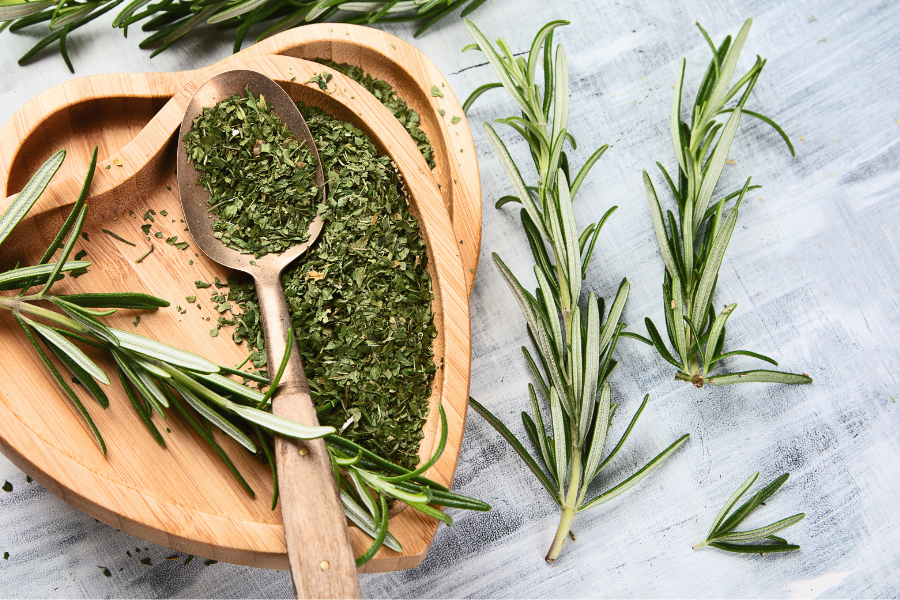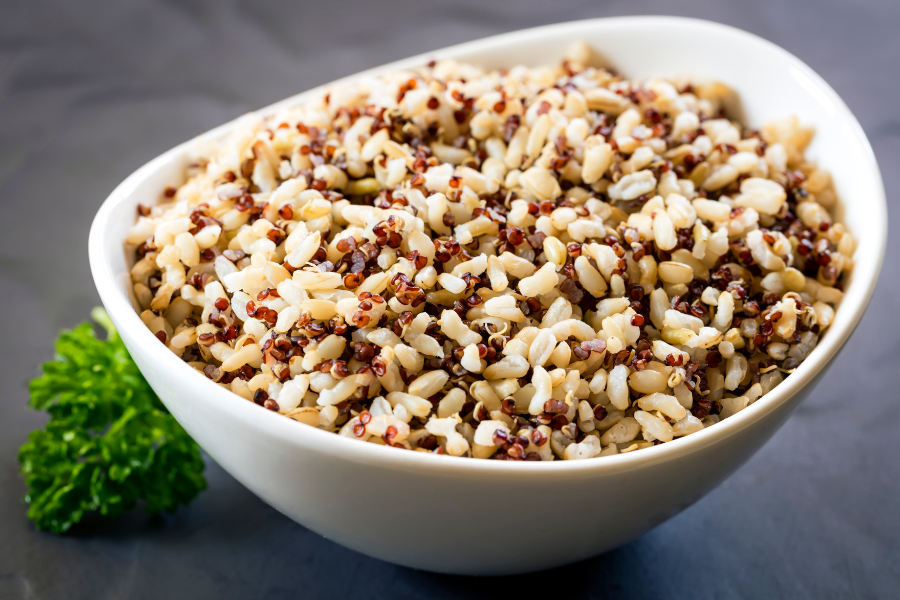Introduction
If you are a health nut and a dog parent, you probably think about your dog's diet and ways in which you can optimize it. Well, we are here to tell you that rosemary may just be an ingredient to help you do exactly that (optimize your pup's diet).
You have probably seen rosemary listed as an ingredient in both dog foods and store-bought dog treats. So why do so many dog food companies use it as an ingredient?
We will answer this question and much more, including the possible benefits (and risks) of feeding rosemary to your pup. We will also do some fact-checking of rumors about rosemary's use.
What Exactly Is Rosemary?
Rosemary is a well-known perennial herb, and if you are like "what the heck is perennial!?", it basically means a plant that will live for two years or more. It is used in cooking throughout the world. With its pleasant, aromatic scent and flavor, it really is a culinary star. And it is actually a member of the ..... mint family! Yes, you read that correctly. Rosemary is not just utilized in the kitchen, either. It has been used for centuries by different cultures for its medicinal properties.
Rosemary Through the Ages
It really is an enchanting herb, rosemary, and its history is both long and interesting. It was revered by the ancient Egyptians, who thought it had holy powers. They used it during funeral ceremonies to protect the souls of the deceased.
Over in Greece and Rome, rosemary adorned the heads of scholars, who believed that it could give them a cognitive boost! It continued to hold significance in the middle ages in Europe, where it was seen as a symbol of love and loyalty, and was regularly incorporated into a bride's wreath. As the world embraced the power of herbal medicine, rosemary emerged as a powerful elixir, known to increase blood circulation, alleviate pain, and even banish malevolent spirits.
Rosemary offers significant health benefits for humans, overflowing with antioxidant and anti-inflammatory properties. This makes it a top choice in recipe preparations, therapeutic teas, and a variety of skincare products. But how does rosemary fare with our furry friends? Can they also gain from the health perks of this herb?
Is Rosemary Safe for Dogs?
Okay, so getting to the answer we came here for! Typically (i.e. not always) rosemary is okay for dogs, when given in moderation. And the reason why you see it as an ingredient in such a high percentage of dog food product is because it acts as a natural preservative. So in small amounts rosemary is harmless for your dog, and it may even give your pup a little health boost.
But, remember, it's crucial to incorporate any new ingredient into your dog's diet slowly. Every dog is different and has unique reactions, so despite rosemary being okay for most, your doggo might respond in an unexpected and adverse way. to rosemary That is why whenever you add something new to their meal plan, you should always observe your dog for potential adverse reactions or allergies.
Health Benefits of Rosemary for Dogs
Rosemary: A Trove of Antioxidants
Rosemary is absolutely jam-packed with antioxidants. Antioxidants, in layman's terms, serve as shields for cells, safeguarding them against damage (from free radicals). This antioxidant activity, in turn, can boost not only the immune system of both dogs and humans, but it can also enhance overall.
Anti-Inflammatory Capacities
Rosemary contains anti-inflammatory compounds, which could be advantageous for dogs troubled with pain issue like arthritis. This does not mean rosemary is an alternative to prescription drugs, but adding some rosemary to your dog's diet could supplement their overall treatment regimen.
Boosting Digestive Well-being
Aiding digestion and resolving gastrointestinal complications are other potential benefits rosemary can offer. It has qualities that are soothing to the digestive system, making it an good fit for dogs that deal with chronic digestive issues.
Glycemic Levels and Rosemary
A recent study has shed light on the potential health benefits of rosemary, particularly its effect on blood sugar levels in dogs. The intriguing research was carried out using Rottweilers as subjects, split among five different dietary plans. The first group (G1) served as a reference point, with a diet free from any enhancements. The second group (G2) consumed a diet bolstered with a readily available synthetic flavor-enhancer, as a contrasting control. The third group's (G3) diet was enriched with rosemary at a concentration of 0.05%, whereas the fourth group (G4) was fed with a basil-enriched diet, also at the same percentage. The final group (G5) was given a mix of both rosemary and basil, each at 0.025% fortification. The research aimed to evaluate the impact of such dietary alterations on the dogs' blood sugar levels. Preliminary results have pointed towards a promising role for rosemary in shifting these levels, underscoring its potential as a beneficial ingredient in dog food.
How to Incorporate Rosemary into Your Dog's Diet
Homemade Treats
Baking some homemade dog treats, or even a dog cake? Try adding a sprinkle of dried rosemary to the mix. It can both enhance the flavor and provide the benefits mentioned above.
Infused Oils
Consider creating a rosemary-infused oil. A few drops in your dog's food can offer a subtle flavor boost and the associated health benefits.
Fresh Sprigs
If you grow fresh rosemary, or buy some at the store, you can put a sprig in your dog's water or food bowl to freshen it up. Just make sure you wash it and cut it into small pieces so it is not a choking hazard.
Myths and Misconceptions About Rosemary and Dogs
Myth 1: Rosemary Causes Seizures in Dogs
There's a common misconception that rosemary can trigger seizures in dogs. While it's true that some dogs may be more sensitive, we could not find any empirical evidence that rosemary causes seizures.
Myth 2: All Herbs Are Bad for Dogs
This is not true. Not all herbs are harmful to dogs. While some herbs and spices are toxic for dogs (cough-cough garlic and onions), there are plenty of herbs, like rosemary and basil that are generally safe and beneficial for dogs. It is vital to know which foods, herbs and spices are safe for dogs.
Myth 3: More Rosemary is Better
Untrue. Like anything, rosemary should be given in moderation. Too much rosemary can easily cause digestive distress in dogs.
Rosemary Alternatives for Dogs
If your dog does not love rosemary from the get go, don't sweat it! There are herbs out there that have similar benefits. Consider parsley if your dog tends to have less than fresh breath, and turmeric if your dog needs extra anti-inflammatory support. Always do your due diligance about new foods you give your dog, and consult with your vet before adding anything new dog's diet.
Rosemary vs. Turmeric for Dogs
When it comes to enhancing your dog's diet with herbs, both rosemary and turmeric bring their own unique, heavy-hitting benefits to the table. Rosemary is an antioxidant powerhouse that offers natural preservative qualities and may support digestion and immune health. Its anti-inflammatory properties can also be a welcome addition for dogs dealing with arthritis or joint issues. Turmeric is also celebrated for its potent anti-inflammatory and antioxidant properties, ideal for strengthening your pup’s immune system and providing joint support. Turmeric contains curcumin, which is thought to reduce inflammation more effectively than rosemary.
While both herbs are beneficial, each dog may respond differently depending on their specific health needs. Choosing between rosemary and turmeric can depend on factors such as your dog's taste preferences, specific health conditions, and existing diet. Remember, variety is key, and both herbs can be a part of a balanced and nutritious regimen. As always, start with small amounts and monitor your furry friend for any adverse reactions when introducing new ingredients to their diet. Consulting with your veterinarian is a great way to tailor your dog's diet to their individual health needs and ensure they're getting the most from these natural herbs.

Conclusion
To sum things up, adding a little rosemary into your dog's meals is likely okay and could even be beneficial for them. Rosemary is full of antioxidants and anti-inflammatory compounds, which can offer a wide range of health benefits.
It is important to note, however, that some dogs may be more sensitive to rosemary than others. If you are going to give your pup rosemary, make sure you do so slowly and be very observant of their response!
References
1) Hussain SM, Syeda AF, Alshammari M, Alnasser S, Alenzi ND, Alanazi ST, Nandakumar K. Cognition enhancing effect of rosemary (Rosmarinus officinalis L.) in lab animal studies: a systematic review and meta-analysis. Braz J Med Biol Res. 2022 Feb 9;55:e11593. doi: 10.1590/1414-431X2021e11593. PMID: 35170682; PMCID: PMC8851910.
2) Abdelrahman N, El-Banna R, Arafa MM, Hady MM. Hypoglycemic efficacy of Rosmarinus officinalis and/or Ocimum basilicum leaves powder as a promising clinico-nutritional management tool for diabetes mellitus in Rottweiler dogs. Vet World. 2020 Jan;13(1):73-79. doi: 10.14202/vetworld.2020.73-79. Epub 2020 Jan 10. PMID: 32158154; PMCID: PMC7020113.



